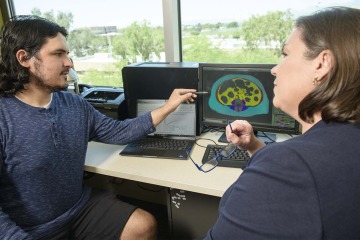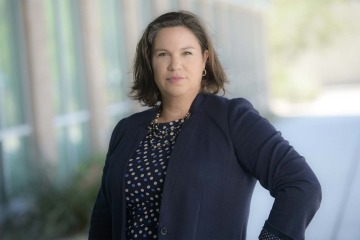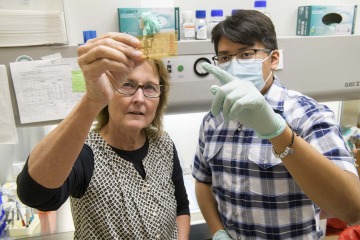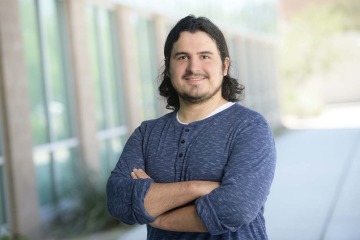Native American Cancer Research Internship Opens New Doors
A University of Arizona Cancer Center-based program fosters the next generation of Native American scientists and doctors.
Ferris Saad felt an undeniable call to pursue medicine as a way to address health disparities, particularly in Native American communities. Thanks to a unique mentoring program, Saad spent the summer at the University of Arizona Health Sciences immersed in cancer research as he prepares to apply for medical school.

During the summer program, Ferris Saad learned how to identify and analyze different fat and muscle regions on MRI and CT scans while working with Jennifer W. Bea, PhD.
“Cancer was always a big mystery to me, but now oncology is one of my top medical fields of interest,” said Saad, who is pursuing a bachelor’s degree in physiology through the UArizona College of Medicine – Tucson. “I’m learning a lot every day and it's been a blast.”
The summer research opportunity through the Partnership for Native American Cancer Prevention (NACP) and Undergraduate Biology Research Program is a paid internship that pairs Native American undergraduates with a faculty mentor in their research area of interest. In May, Saad began working with Jennifer W. Bea, PhD, associate professor of health promotion sciences in the Mel and Enid Zuckerman College of Public Health and UArizona Cancer Center member.
“I just fell in love with student training – not only helping students learn and grow, but also experiencing what they bring to the team,” Dr. Bea said. “They strengthen our knowledge, cultural sensitivity and connection to the community. And it’s just a pleasure to talk with Ferris and work with him as a person.”
Toward more equitable cancer care in Arizona
Native Americans are the most underrepresented racial or ethnic group among physicians and scientists. This underrepresentation can contribute to health disparities, according to Margaret Briehl, PhD, associate director of the Cancer Research Education and Training Coordination at the UArizona Cancer Center.

Jennifer W. Bea, PhD, leads the Partnership for Native American Cancer Prevention’s Research Education Core.
“With 22 federally recognized tribes and nations in the state, training is one of the best ways to serve the community,” said Dr. Briehl, who also is a professor of pathology and cancer biology. “We want our Native American students to experience firsthand the excitement of biomedical research.”
The summer research internship is just one aspect of the NACP, a partnership between the UArizona Cancer Center and Northern Arizona University funded by the National Cancer Institute. The NACP is designed to address the unequal burden of cancer among Native Americans in Arizona through training, research and community outreach.
“This program gets students engaged in research early in the pipeline,” said Dr. Bea, who leads the NACP’s Research Education Core, including the summer internship. “And then we work with them on other grants to ensure they are supported all the way through their training to become leading scientists, clinicians or whatever they want to be.”
In addition to research, NACP trainees meet weekly, either in small groups or with the larger Undergraduate Biology Research Program group, to learn about topics such as research ethics, and writing an abstract and personal statement. They also work with their mentors to create individualized career development plans for their future.
Heeding the call to make a difference

Under the guidance of mentor Anne Cress, PhD, biomedical engineering senior Elijah Keeswood studied aggressive cancer tumors during the Partnership for Native American Cancer Prevention summer internship program.
“As my first time going into research, I didn’t know what to expect,” said Elijah Keeswood, an NACP trainee who returned for a second year in the program. “But I love doing research. In lab meetings, someone will sometimes show a result that amazes everyone because it wasn’t what they expected. They all try to figure it out and it’s so exciting because it could be a new discovery.”
Keeswood, a senior majoring in biomedical engineering, has been working to understand how aggressive tumors change as they invade and cross the muscle barrier to spread to other parts of the body. He learned how to culture cancer cells in a 3D gel matrix and is now helping analyze images of cancer cells as they move through this matrix or actual muscle tissue.
“I really love looking at those images. The cancer forms a string of cells as it moves through the muscle tissue. It’s both exciting and scary since you know that’s what it’s doing in the body,” Keeswood said. “And I found out that I’m pretty good with computers, which I can put to use in a lot of different scientific areas.”
“It's very satisfying to see how much Elijah has progressed to where he's got ownership of the project,” said his mentor, Anne E Cress, PhD, professor of cellular and molecular medicine and radiation oncology in the College of Medicine – Tucson and a member of the Cancer Center. “I think the biggest surprise for me in mentoring undergraduates – and Elijah is no exception – is what they give back to us. They are a really important part of the team.”
Experiencing cancer research firsthand

Undergraduate physiology major Ferris Saad got a first-hand look at the field of oncology through a summer internship program that paired him with a faculty mentor from the UArizona Cancer Center.
Though the summer internship ended this month, Saad will continue his training part-time during the school year. One of his projects examines how body composition, such as the amount of deep fat around the kidneys and liver, affects kidney cancer prognosis in patients. For the study, Saad learned how to identify and analyze different fat and muscle regions on MRI and CT scans.
“CT scans can be quite hard to read. The first time you see one, you’re like, ‘What are all these blobs and polka dots?’” Dr. Bea said. “Getting practice early on distinguishing between organs and other tissues can be really valuable for medical school and a great exercise in anatomy.”
Saad also is in the early stages of reaching out to tribal communities across Arizona to understand individual access to digital technology and preferences for getting health information.
“I’ve learned a lot about coordinating with tribal leaders, and drafting up a plan to engage with the community and do a preliminary needs assessment,” Saad said.
Dr. Bea hopes this knowledge will be invaluable to tribal leaders as they distribute public health information to the people in their communities.
Our Experts
Contact
Megan Guthrie
520-626-2280
mlg1@arizona.edu

